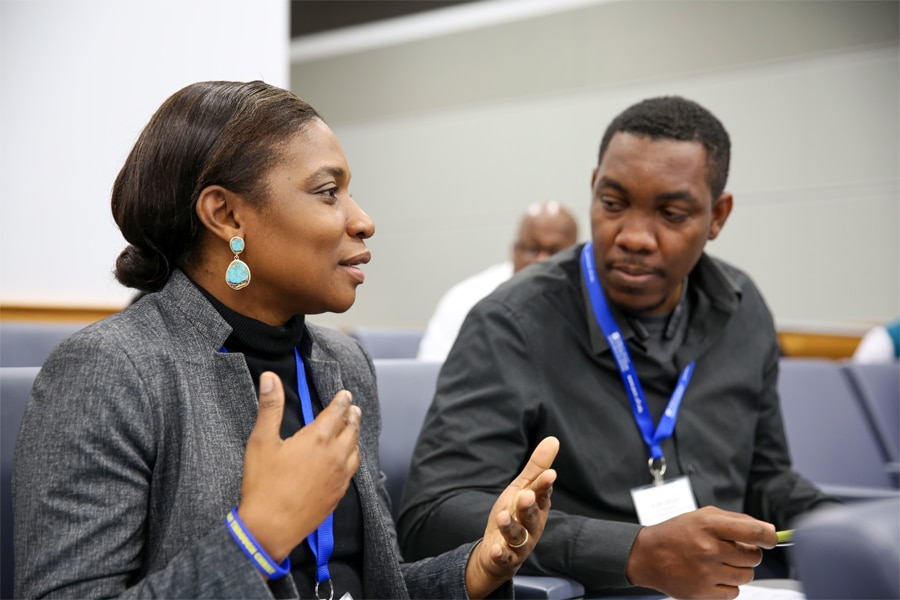
Training and development
Principles and practices that support good utility policy
Learn to support effective utility policy, regulation, management and leadership with courses, workshops and training designed by the Public Utility Research Center.
We help government officials and industry professionals develop efficient utility infrastructure to better meet the needs of their customers.
PURC’s extensive network of utility and regulatory experts around the world work with the Warrington College of Business to connect theory and practice in ways that extend understanding of energy, water, and telecommunications sectors. We deliver utility training programs in Florida, the nation and around the world.
PURC/World Bank International Training Program on Utility Regulation and Strategy
The international training program is an intensive course specifically tailored to the professional requirements of utility regulators and regulatory staff. The course is designed to enhance the economic, technical, and policy skills required for implementing policies and managing sustainable regulatory systems for infrastructure sectors. Each program encompasses more than 35 sessions that include case studies, practical exercises and panel discussions with leading experts and international faculty.
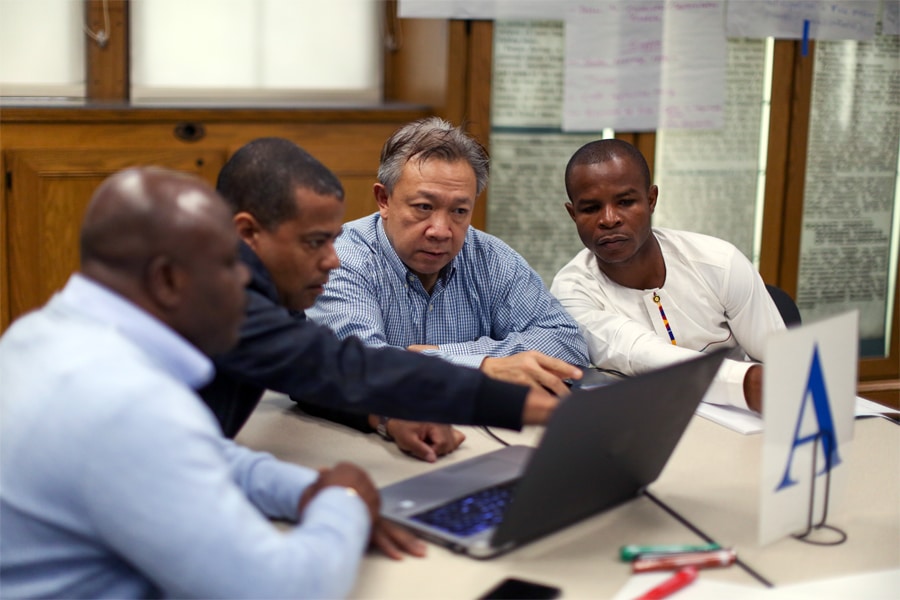
You will learn:
- Why countries are reforming their utility sectors and the basic approaches
- How competition affects tariff rebalancing, cross-subsidization, and funding of social obligations
- How to conduct price reviews
- How to determine the cost of capital and assess the projects, particularly in countries with scarce or unreliable cost information
- What incentive rules promote competition, efficiency, and innovation
- What the effective regulatory strategies are for monitoring performance and enforcing compliance
- Where competitive forces can be introduced or strengthened
- What the key considerations are in rate design
- What the key considerations are for the establishment and functioning of regulatory institutions
- How the regulatory process can promote legitimacy and credibility of regulatory decisions
As the utility landscape rapidly evolves, the role of emerging technologies — especially artificial intelligence — is becoming increasingly important. At PURC, we are committed to equipping you with the tools and insights to stay ahead with the addition of Artificial Intelligence in Utility Regulation series to the training program. Participants in the PURC/World Bank International Training Program on Utility Regulation and Strategy will explore via video:
- What AI is and how it works
- Real-world applications in utility regulation
- The benefits and risks regulators need to consider
Then, during the on-site program, you’ll dive deeper in Session 15: The Challenge of Artificial Intelligence. This interactive session will help you explore how AI is already shaping decision-making—and how you can be involved.
Program cost is $8,795 (U.S.) for utility regulators and $10,995 (U.S.) for staff from private or public infrastructure companies.
The fee includes:
- Program tuition
- Accommodations for 11 nights
- Daytime meals on weekday training days (breakfast, refreshment breaks and lunch)
- Closing program awards reception
- Reading and classroom material
- Basic Economic Training (this economic refresher will be delivered virtually via Zoom in advance of the program)
- Basics of AI for Utility Regulation two-part video series
PURC training is part of a package of programs that support the creation and training of infrastructure regulators. The World Bank, through the Private Provision of Public Services group, provided seed money to PURC in 1996 and continues to collaborate by providing speakers and marketing assistance. The National Association of Regulatory Utility Commissioners is an official promoter of the PURC/World Bank International Training Program on Utility Regulation and Strategy.
Energy and Water Pricing
This course trains experienced utility professionals in the electricity, gas, and water sectors. Participants learn core principles and best practices with an experiential case study in electricity, gas and water pricing from start to finish.
Applications available soon!
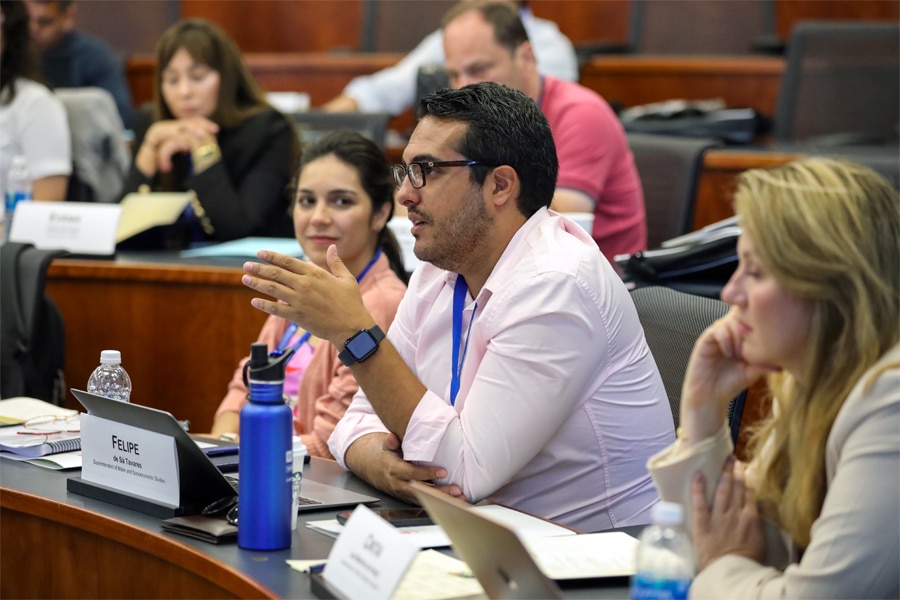
What are the challenges and best practices in energy (electricity and gas) pricing? What are the innovative ideas for addressing efficiency and environmental issues? This advanced energy (electricity and gas) course answers these questions and more as participants (experienced utility professionals in the electricity and gas sectors) learn core principles and engage in a case study in energy pricing from start to finish.
Upon completion of the course, you will be able to:
- Prepare for and perform price reviews
- Develop economic incentives appropriate for utilities in small economies
- Analyze financial statements for rate setting and evaluating sector performance
- Develop innovative price structures that create incentives for consumers and producers to behave in a manner consistent with your utility policy
The $5,795 fee includes:
- Program tuition
- Reading and classroom material
- Hotel accommodations for six (6) nights (arrival Sunday, July 26 and checkout Saturday, August 1)
- Monday – Friday: breakfast, refreshment breaks, lunch
- One dinner
- Please note that participants are on their own for dinner each night, with the exception of one (1) social dinner
If you’re interested in attending both the Energy & Water Pricing course and the Benchmarking Infrastructure Operations course, a discounted fee is offered.
Course fee for both Energy & Water Pricing and Benchmarking Infrastructure Operations is $9,995 USD (savings of $595).
The fee includes:
- Program tuition
- Reading and classroom material for both courses
- Hotel accommodations for twelve (12) nights (arrival Sunday, July 26 and checkout Friday, August 7)
- 1st week (Monday – Friday): breakfast, refreshment breaks, lunch
- 2nd week (Monday – Thursday): breakfast, refreshment breaks, lunch
- Two dinners
Benchmarking Infrastructure Operations
How can utilities be benchmarked for efficiency? Which types of comparisons are valid and which are invalid, possibly leading to significant errors? This advanced infrastructure course answers these questions and more, as participants (experienced utility professionals) analyze the benefits, best practices, and pitfalls of benchmarking utilities.
Applications available soon!
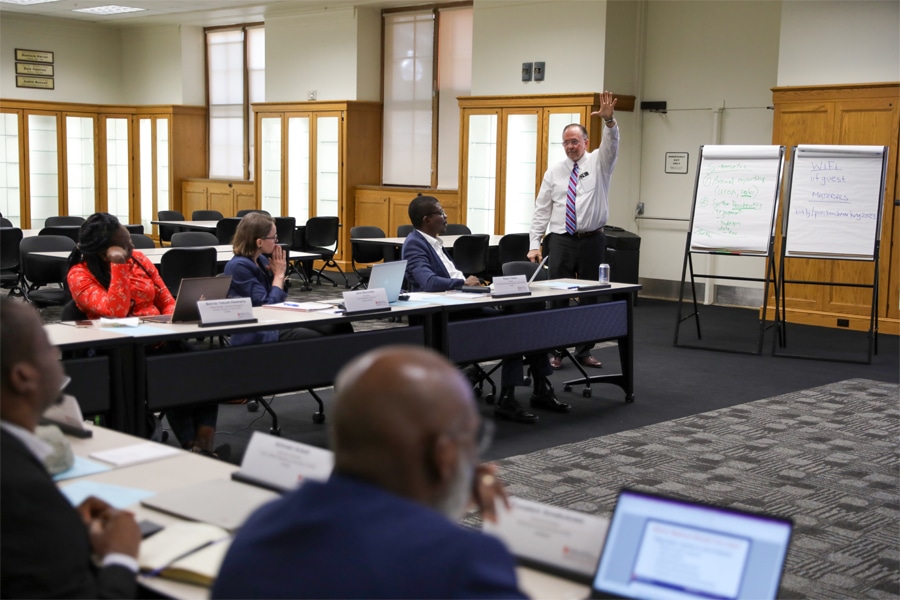
How can utilities be benchmarked for efficiency? Which types of comparisons are valid and which are invalid, possibly leading to significant errors? This advanced infrastructure course answers these questions and more, as participants (experienced utility professionals) analyze the benefits, best practices, and pitfalls of benchmarking utilities.
Upon completion, you will be able to:
- Understand why benchmarking is essential for improving the performance of infrastructure organizations
- Analyze the implications of partial, limited, or incorrect information
- Assess how information on trends in key performance indictors helps decision-makers
- Understand how model specification and data outliers affect performance comparisons
- Identify the strengths and limitations of alternative quantitative methodologies and how to communicate results
The course will be hosted at the University of Florida – Warrington College of Business. Participants will be housed at a hotel adjacent to campus and participants will be able to easily walk over to the training facility.
The $4,795 fee includes:
- Program tuition
- Reading and classroom material
- Hotel accommodations for five (5) nights (arrival Sunday, August 2 and checkout Friday, August 7)
- Monday – Thursday: breakfast, refreshment breaks, lunch
- One dinner
- Please note that participants are on their own for dinner each night, with the exception of one (1) social dinner. There are a number of dining options within safe walking distance of the hotel.
If you’re interested in attending both the Benchmarking Infrastructure Operations course and the Energy & Water Pricing course a discounted fee is offered.
Course fee for both courses is $9995 (savings of $595).
The fee includes:
- Program tuition
- Reading and classroom material for both courses
- Hotel Accommodations for twelve (12) nights (arrival Sunday, July 26 and checkout Friday, August 7)
- 1st week (Monday – Friday): breakfast, refreshment breaks, lunch
- 2nd week (Monday – Thursday): breakfast, refreshment breaks, lunch
- Two dinners
Practicing Leadership in a Political Environment
A one-day intensive training for leaders in utility policy. In this workshop you will examine the activities, behaviors, mindsets and skills of a successful leader.

Many people are called upon to provide leadership. Some succeed. Many fail. In this workshop you will examine the activities, behaviors, mindsets and skills of a successful leader.
As a participant, you will learn and practice the following:
- Identify and develop your own leadership profile. Learn to create leadership in others.
- Examine personal practices of successful leaders in developing vision, resolving conflicts and setting priorities. Create a strategy for managing the relationships that are critical to your success.
- Discover opportunities for growth in your organization and intervention methods that encourage collaboration and team cohesiveness. Learn how executive leaders create an organizational focus around the most important priorities.
- Analyze what is different about practicing leadership in a political environment.
- Develop a personal leadership action plan and an accountability system for addressing your most important challenges. Receive feedback to develop skills for managing yourself and others.
Upon completion of the workshop, you will develop and take home an implementation guide and action plan.
Fee
- US $795 for the PURC/World Bank International Training Program participants
- US $1,195 for all others
Fee includes tuition, reading material, lunch, morning and afternoon snacks and course material in English.
Workshop methodology
The workshop will use the field laboratory method of examining participants’ own leadership challenges. Most learning will take place in teams and will use personal cases and scenarios as teaching points. Instructors will present tool kit sessions followed by intensive personal application exercises and team presentations.
Comprehensive Regulatory Impact Analysis
Are your utility regulations achieving desired results? Do you have the proper tools to analyze their impacts? Do you want your studies to be the gold standard by which all others are measured? Do you want your studies to be used and not shelved? The on-demand online course for utility regulators, policy makers, and infrastructure professionals has been redesigned for self-paced, individual participation. Once payment is received, you will have six months to complete the course work.
How to enroll with screenshots

Avoid the pitfalls that stifle utility regulatory decisions and gain support for difficult issues. Learn how to effectively and rigorously analyze and communicate the impacts of regulations, wherever you are. With our online course, Comprehensive Regulatory Impact Analysis, you will learn from experts and exchange experiences and best practices with peers through the latest in Internet technology.
The course Comprehensive Regulatory Impact Analysis provides tools and approaches for regulatory impact analysis, a systematic appraisal of the potential impacts of a regulatory decision to assess whether the decision is likely to achieve the desired objectives and at what cost. Through case studies, exercises, and lectures, course participants learn how to identify key questions, identify stakeholders and engage them in the analysis, use appropriate analytical techniques, and communicate their findings.
Outcomes
At the conclusion of the course, you will be able to structure a RIA process. In addition, the course will take you beyond process to higher levels of RIA substance and communication. You will be able to:
- Project the impacts of alternative regulatory policies on different customer classes, including alternative rate designs, conservation programs, and service quality improvements
- Incorporate advanced elements into RIAs, including uncertainty (and the precautionary principle), option values (for the timing and sequencing of projects), and referent analysis (identifying the impacts on different stakeholder groups and on the environment)
- Analyze potential impacts on infrastructure performance based on simulations
- Develop strategies and systems for tracking the results of regulatory decisions
- Communicate RIA to decision makers and stakeholders by categorizing benefits, costs, and associated risks in clear and comprehensible language
Course structure
This is a self-paced course and will be delivered entirely online through the University of Florida’s course management system, Canvas. In Canvas, you will access video lectures, course materials, course case study and additional resources. Activities include:
- Watching recorded lectures
- Completing six written assignments
- Meeting with the PURC faculty for three office sessions (approximately 30 minutes each) via Zoom to address your specific case and any questions you have regarding the content.
Access to Canvas will be provided once your payment is received.
Completion of assignments within six months of registration is required to receive the certificate of completion
Course requirements
- Internet connection (DSL, LAN, or cable connection desirable)
- Chrome is the recommended web browser for Canvas. Internet Explorer and Safari should not be used to access Canvas.
- Access to course management system, Canvas.
- Completion of six assignments.
- Engagement with course faculty in three office sessions hosted via Zoom.
- All course assignments must be completed within six months of registration to receive certificate of course completion.
Course fee
Regular course fee of $1,495 includes:
- Program tuition
- Reading and online classroom material
- Three office sessions (approximately 30 minutes each) via Zoom with PURC faculty
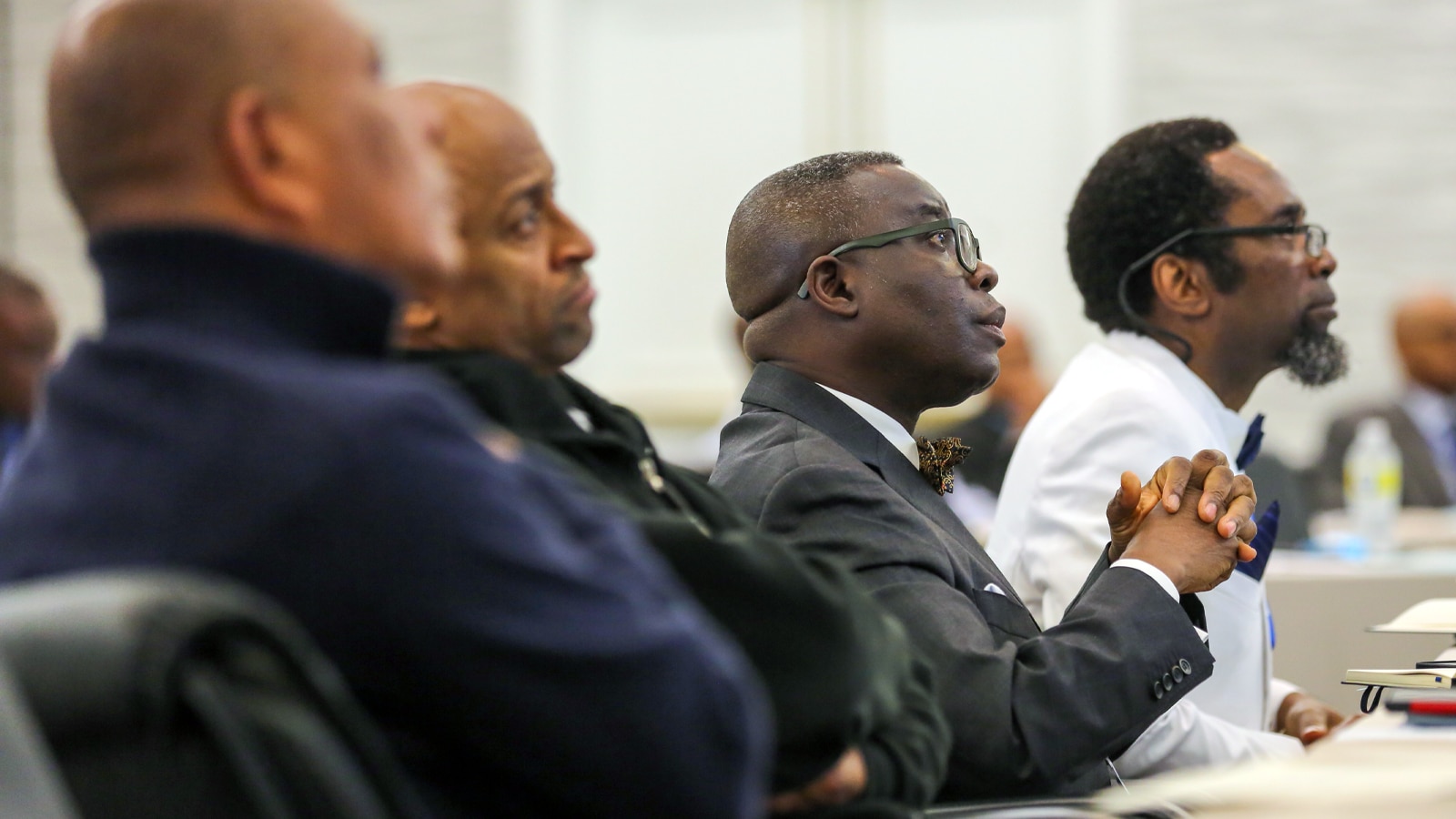
PURC Annual Conference
For more than 50 years, the Public Utility Research Conference has served as a neutral forum for key leaders in industry and academia, primarily from Florida and the Southeast.
PURC Leadership Services
PURC Leadership Services help you transform your agency or company by identifying what is truly holding it back from realizing its goals and by providing the tools to solve your challenges. We equip professionals at every level of the organization by leveraging their talents, creativity and energy to take charge of their own future. PURC’s interactive, case-oriented approach is designed for our clients to become world-class leaders.

Leadership services
- Practicing Leadership in a Political Environment – an intensive, one-day workshop
- Next Generation Leaders: CEOs Dialogue – a virtual development program for working professionals
- Customized leadership training – tailored program and tools to meet your specific needs. We work with individuals and groups at every level of the organization to affect the necessary change and move forward in your challenges. Clients reach out when they:
- Want to develop a robust leadership culture
- Find themselves failing to reach aspirations
- Are preparing for a significant change
- Want individuals or groups to take ownership of the organization’s success

One-on-one coaching
Coaching is designed to help you move from where you are to where you want to be. Whether you’re struggling with your own individual challenges, need to create a holding environment for change in your team, or have to mobilize others in difficult situations, our practice will coach you through the process to achieve your goals.
Together we will explore your issues, discover what may hold you back, and study the best possible interventions for your context. Whether you are at the top of the organization or practice leadership at any level, our coaching services are for you.
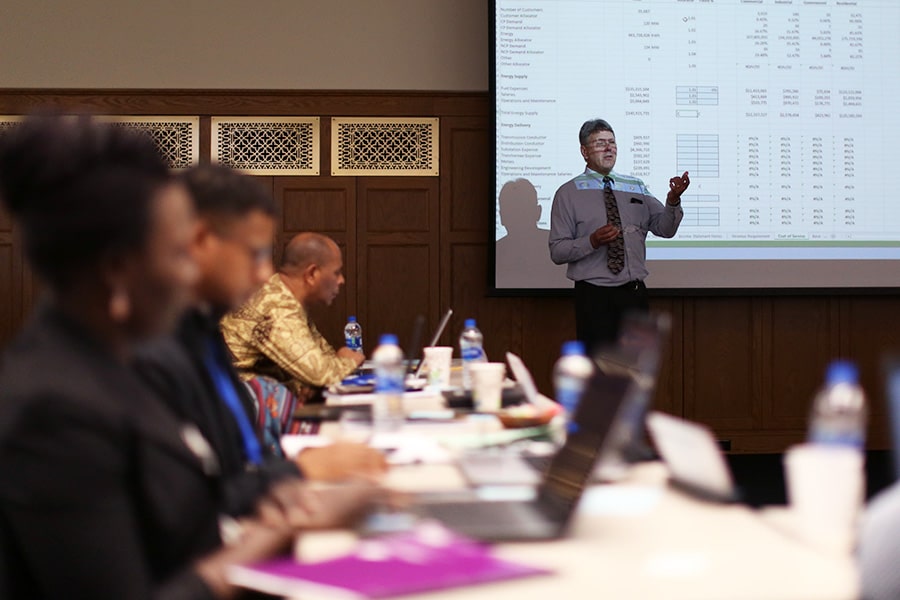
Transformation Package
The package resolves problems by allowing an organization to mix and match our methods, courses, customized leadership development, and receive advisory services that develop a confident culture that continuously learns and expands its leadership capabilities.
- Three seats each in three courses of your choosing
- Thirty hours of leadership training and coaching fo 10 individuals
- Thirty hours of advisory assistance on regulatory techniques, strategy, and leadership
Choose different members of your organization for each aspect, but we recommend that a core of five people participate in all three aspects.
The price for our Transformation Package is $180,000.
Customized training
Our tailored utility infrastructure training programs are individually designed to help you identify the best solutions to the pressing issues you face today. By working with you to design the program, we can deliver the most relevant curriculum, expand upon your organization’s existing competencies, and develop tailored strategies using the right tools for the job.
- Leadership, strategic planning, independence, transparency, stakeholder involvement, negotiating skills, benchmarking, economic and financial analysis
- Expanding understanding of the pricing of infrastructure services.
- Developing skills for price reviews and rate cases.
- Enhancing knowledge of market structure and design.
- Building capacity to address environmental considerations.
- Knowledge of technology issues, stakeholder perspectives and relationships.
- Improving policy-making and implementation.
Programs teach the principles and practices that support effective utility policy and regulation. Instructional approaches include case studies, lectures, client problem-solving, simulations, video, e-learning, and site visits. Training is rigorous, but practical.
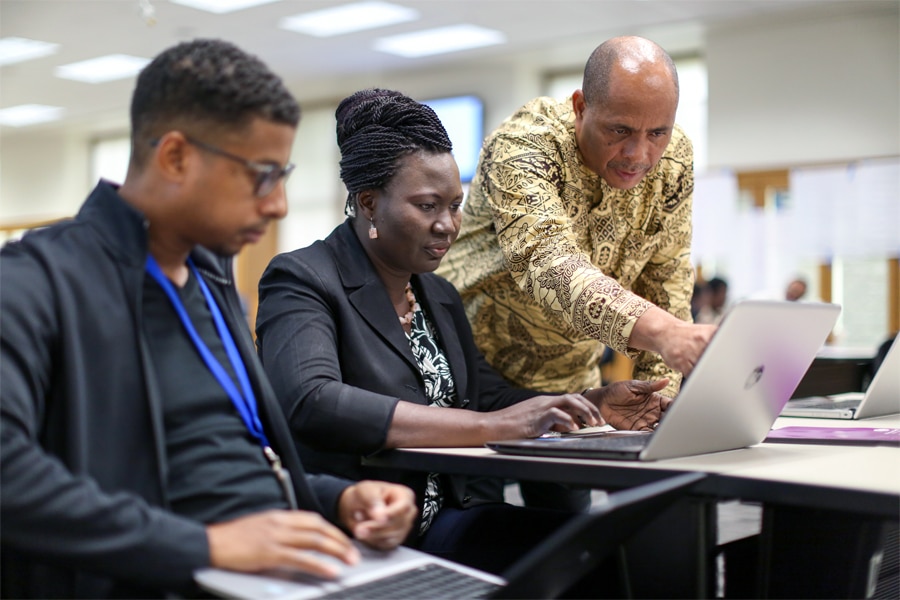
- Fundamentals, purpose and role of utility regulation
- Regulating utility markets, finances, prices, and services
- Regulatory issues and cost of service
- Industry structure, markets and competition
- Electric fuel
- Electric and energy issues
- Advanced course on regulatory economics and process
- Competition in convergence markets: open access and financial analysis
- Competitive analysis in telecoms: current and future markets
- Infrastructure sharing for broadcasting
- Methods in radio spectrum planning and management
- Telecom policy and regulation for next generation networks
- Executive leadership, strategic planning and organizational development
- Leadership and management skills for state utility regulators

PURC has developed customized training programs for ARSESP (Agencia Reguladora de Saneamento e Energia de estado de Sao Paulo), the National Broadcasting and Telecommunications Commission of Thailand, Aqualectra, the Florida Public Service Commission, the Nigerian Power Holding Company, and the Bermuda Department of Energy, to name a few.
Our experts will be in touch with you shortly to further discuss your needs.
